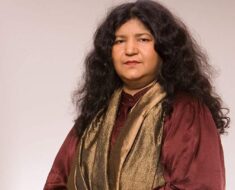Sachin Dev Burman, or S. D. Burman, was a legendary Bollywood music director and singer. His contributions to Indian music are unparalleled, earning him the title of “Grand old man of music”. This post explores his life, career, and legacy.
Wiki/Biography
S. D. Burman (Sachin Dev Burman) was born on Monday, October 1, 1906 (age 69 at the time of death) in Comilla, Tripura, British India. His zodiac sign was Libra. He received his early education at Kumar Boarding in Agartala, Tripura, and Yusuf School, Comilla. He later graduated with an arts degree from Victoria College, Comilla.
Physical Appearance
- Height (approx.): 6′ 0″
- Eye Colour: Black
- Hair Colour: Black
Family, Caste & Wife
Born into the royal family of Tripura, his father was Mahamanyabar Rajkumar Nabadwipchandra Dev Burman, and his mother, Nirmala Devi, was a royal princess of Manipur. He had six siblings – four elder brothers and two sisters. His mother passed away when he was two years old.
In 1930, he founded a music school, ‘Sur Mandir,’ where Meera Dasgupta was a student. Their relationship blossomed, leading to their marriage on February 10, 1938. Their marriage faced challenges due to Meera’s family background, ultimately causing a rift with Sachin’s family.
On June 27, 1939, they welcomed their only son, the renowned R. D. Burman (Rahul Dev Burman).
Career
Sachin received initial musical training from his father. Between 1925 and 1930, he underwent professional vocal training under K. C. Dey. His further training included tutelage under Bhishmadev Chattopadhyay, Khalifa Badal Khan, and Ustad Allauddin Khan.
He began his career as a radio singer for AIR Calcutta in the late 1920s. His first record, released in 1932 with Hindustan Records, featured “E Pathey Aaj Eso Priyo” and the folk song “Dakle Kokil Roj Bihane”.
He sang Thumri at the All India Music Conference and Bengal Music Conference in Kolkata in 1934, an event inaugurated by Rabindranath Tagore. His musical journey extended to composing for Bengali plays like ‘Sati Tirtha’ and ‘Janani,’ before transitioning to film with his debut as a music director for the Bengali movie ‘Rajgee’ (1937).
His move to Mumbai in 1944, initially met with some disillusionment, eventually led to major successes with films like Mashaal (1950), and collaborations with Dev Anand’s Nav Ketan Productions on films such as Taxi Driver (1954), Nau Do Gyarah (1957), and Kala Paani (1958). He also contributed to iconic films like Pyaasa (1957), Kaagaz Ke Phool (1959), and Devdas (1955).
His prolific career included numerous hits, such as Guide (1965), Tere Mere Sapne (1971), Sharmeelee (1971), Abhimaan (1973), Prem Nagar (1974), Sagina (1974), Chupke Chupke (1975), and Mili (1975). It was during the rehearsal for “Badi Sooni Sooni” (sung by Kishore Kumar) for Mili that he suffered a coma.
Controversies
A significant disagreement with the lyricist Sahir Ludhianvi regarding the relative importance of lyrics and music in a song led to a permanent professional rift between them.
His demanding nature and unwillingness to tolerate the perceived “starry tantrums” of Lata Mangeshkar resulted in a period where they did not collaborate. This changed later, partly due to the intervention of R. D. Burman.
Awards & Honours
His accomplishments earned him numerous accolades, including:
| Award | Year | Category | Film (if applicable) |
|---|---|---|---|
| National Film Award | 1970 | Best Male Playback Singer | Aradhana |
| National Film Award | 1974 | Best Music Direction | Zindagi |
| Padma Shri | 1969 | Contribution to the music industry | |
| Filmfare Award | 1954 | Best Music Director | Taxi Driver |
| Filmfare Award | 1973 | Best Music Director | Abhimaan |
| BFJA Award (multiple) | 1965, 1966, 1969, 1973 | Various categories (Best Music, Best Male Playback Singer) | Various films |
A commemorative postage stamp was released by the Indian Postal Department on his 101st birth anniversary in Agartala on October 1, 2007.
Signature
[Description of his signature – replace with image if allowed]
Favourite Things
- Sport(s): Football, Tennis, Cricket, Hockey
- Food: Fish and Paan
- Attire: White Kurta Pyjama
- Singer(s): Kishore Kumar and Manna Dey
- Music Composer(s): Madan Mohan and Khayyam
- Actor(s): Dev Anand and Guru Dutt
- Colour: White
- Music: Bengali folk
Death
Following a stroke and subsequent coma, he passed away on October 31, 1975, in Bombay.
Facts
He was affectionately known by various names: “Sachin Karta” in Kolkata, “Burman Da” in Mumbai, and “Sochin Deb Burman” in Bangladesh.
His love for sports extended to playing cricket for the YMCA club, tennis, and football (as a centre-forward, supporting East Bengal). His passionate support for East Bengal was such that he would cry and stop eating after a loss. Even while hospitalized, news of a team victory reportedly brought a response from him.
He received the Sangeet Natak Akademi Award in 1958, being the only music director to receive this honour at that time. He also lent his voice to iconic songs.
His mentees included R. D. Burman, Nasir Hussain, and Anuradha Paudwal. He also nurtured the talents of Asha Bhosle, Kishore Kumar, Hemant Kumar, and Danny Denzongpa.
His fondness for Kishore Kumar, whom he considered a second son, is well documented. Kishore Kumar’s visit to him during his hospitalization shows the depth of their relationship.
His wife, Meera, spent her later years in a retirement home, where she eventually passed away on October 15, 2007.
Interestingly, Sachin Tendulkar’s name is a tribute to S. D. Burman, thanks to his grandfather’s admiration for the composer. In 2012, Bangladesh’s Prime Minister, Sheikh Hasina, announced plans to transform S. D. Burman’s ancestral home into a folk cultural institute and museum. A statue of S. D. Burman was unveiled in Kolkata in 2018.






